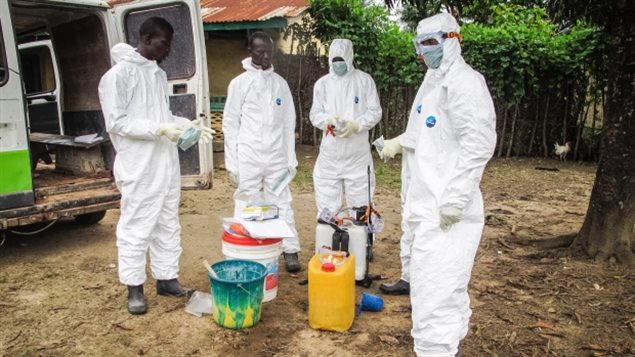Canada is being asked to explain why it has imposed travel restrictions to and from Ebola-stricken countries that run counter to the International Health Regulations which say they must be based on science. The World Health Organization has asked for its justification and Canada’s action has been criticized by health policy experts.
“This seems to me to be a serious deviation from the global leadership that Canada has shown in global health,” said David Fidler, a professor of law and Indiana University who has been a legal consultant to the World Health Organization (WHO).
ListenIn fact, Canada helped draft the International Health Regulation after the 2003 outbreak of SARS in Toronto, in part, to avoid damaging bans on travel and trade that are not based on scientific evidence.

Visa delays of 90 days
But now, Canada has imposed a 90-day delay on the visa applications for anyone who has travelled from or through the countries hardest hit by Ebola. That would include Guinea, Sierra Leone and Liberia. Health experts agree the incubation period for Ebola is only between two and 21 days. The WHO is only calling for restrictions on the travel of infected patients or people who have come into contact with Ebola patients, not including protected health care workers.
In defending the action, the Canadian government says the restriction will not affect Canadians and is not a general travel ban. Fidler says that does not adequately explain why it has imposed the restrictions.
Canada using ‘legal gymnastics’
Canada is using “legal gymnastics” to try to justify itself, he says. “It’s intentionally avoiding the question that’s sitting there right in front of them which from, as far as I can tell, they have not answered.”
Canada is well-respected in global health, so when it and other countries like the United States and Australia establish travel restrictions stricter than what is recommended by the WHO, Fidler says it threatens to unravel international agreements.
‘A very bad precedent in global health’
It’s bad for international trade and travel, it does not protect public health and it can infringe on civil liberties, says Fidler. “It begins to look like the strong do what they will and the weak suffer what they must. This goes to a bad place. This is why this is important in terms of setting a very bad precedent in global health.”







For reasons beyond our control, and for an undetermined period of time, our comment section is now closed. However, our social networks remain open to your contributions.